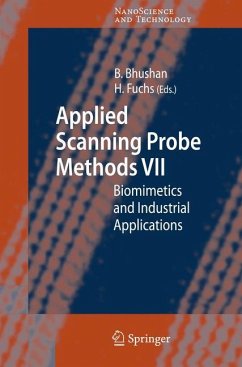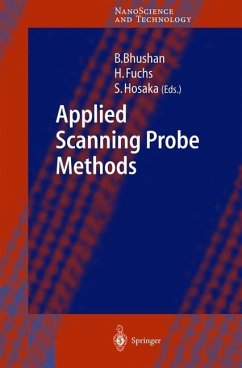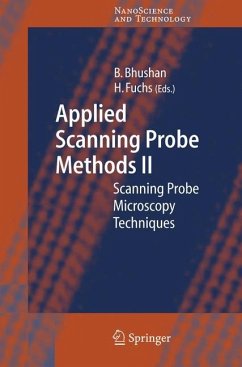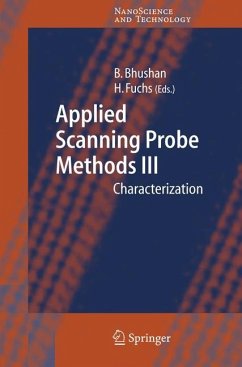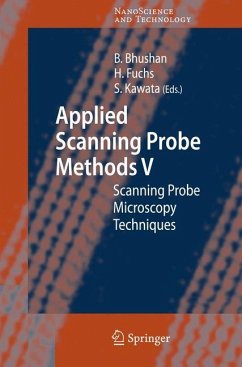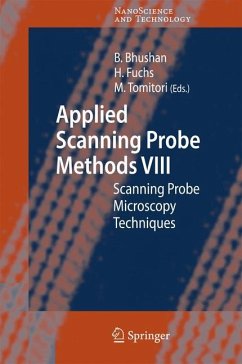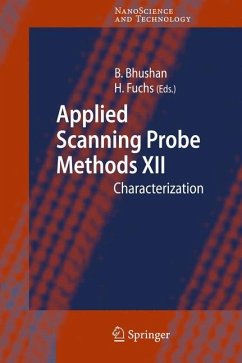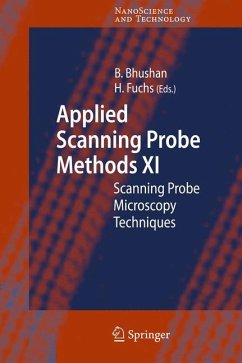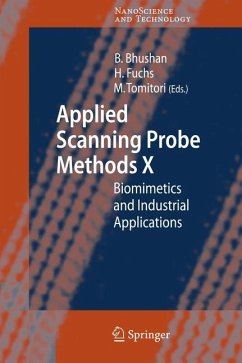
Applied Scanning Probe Methods IV
Industrial Application
Herausgegeben: Bhushan, Bharat; Fuchs, Harald
Versandkostenfrei!
Versandfertig in 6-10 Tagen
76,99 €
inkl. MwSt.

PAYBACK Punkte
38 °P sammeln!
The Nobel Prize of 1986 on Sc- ningTunnelingMicroscopysignaled a new era in imaging. The sc- ning probes emerged as a new - strument for imaging with a p- cision suf?cient to delineate single atoms. At ?rstthere were two the ScanningTunnelingMicroscope,or STM,andtheAtomicForceMic- scope, or AFM. The STM relies on electrons tunneling between tip and sample whereas the AFM depends on the force acting on the tip when itwasplacednearthesample.These were quickly followed by the M- netic Force Microscope, MFM, and the Electrostatic Force Microscope, EFM.TheMFMwillimageasinglemagneticbitwithfeaturesa...
The Nobel Prize of 1986 on Sc- ningTunnelingMicroscopysignaled a new era in imaging. The sc- ning probes emerged as a new - strument for imaging with a p- cision suf?cient to delineate single atoms. At ?rstthere were two the ScanningTunnelingMicroscope,or STM,andtheAtomicForceMic- scope, or AFM. The STM relies on electrons tunneling between tip and sample whereas the AFM depends on the force acting on the tip when itwasplacednearthesample.These were quickly followed by the M- netic Force Microscope, MFM, and the Electrostatic Force Microscope, EFM.TheMFMwillimageasinglemagneticbitwithfeaturesassmallas10nm. WiththeEFMonecanmonitorthechargeofasingleelectron.Prof.PaulHansma atSantaBarbaraopenedthedoorevenwiderwhenhewasabletoimagebiological objects in aqueous environments. At this point the sluice gates were opened and amultitudeofdifferentinstrumentsappeared. There are signi?cant differences between the Scanning Probe Microscopes or SPM, and others such as the Scanning Electron Microscope or SEM. The probe microscopes do not require preparation of the sample and they operate in ambient atmosphere, whereas, the SEM must operate in a vacuum environment and the sample must be cross-sectioned to expose the proper surface. However, the SEM canrecord3Dimage andmovies, featuresthatarenotavailable withthescanning probes. TheNearFieldOpticalMicroscopeorNSOMisalsomemberofthisfamily.At thistimetheinstrumentsuffersfromtwolimitations;1)mostoftheopticalenergy is lost as it traverses the cut-off region of the tapered ?ber and 2) the resolution is insuf?cient for many purposes. We are con?dent that NSOM s with a reasonable opticalthroughputandaresolutionof10nmwillsoonappear.TheSNOMwillthen enterthemainstreamofscanningprobes. VI Foreword In the Harmonic Force Microscope or HFM, the cantilever is driven at the resonantfrequencywiththeamplitudeadjustedsothatthetipimpactsthesampleon each cycle. Theforcesbetween tipandsample generate multiple harmonics inthe motionofthecantilever.Thestrengthoftheseharmonicscanbeusedtocharacterize thephysicalpropertiesofthesurface.



